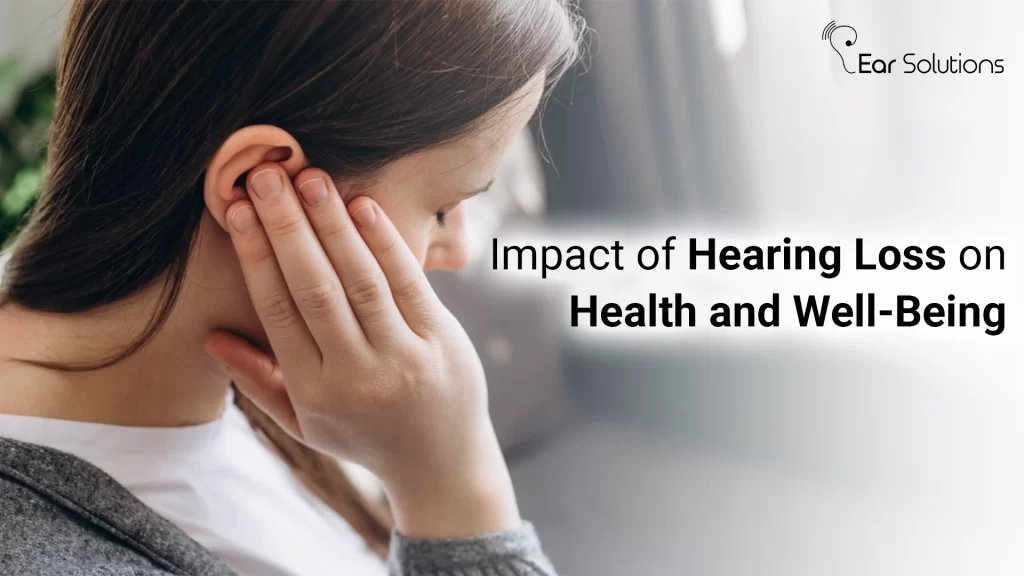Hearing loss is often perceived as an inconvenience or a natural part of ageing, but its effects extend beyond communication difficulties. It can profoundly impact an individual’s overall health and well-being, affecting various aspects of life, from social interactions to cognitive function. In this detailed blog, we’ll explore the multifaceted impact of hearing loss on health and well-being and discuss strategies for managing and mitigating its effects.
Understanding the Scope of Hearing Loss
Hearing loss is a prevalent condition affecting millions of people worldwide, regardless of age or background. It can range from mild to profound and may occur gradually over time or suddenly due to injury or illness. Common causes of hearing loss include ageing, exposure to loud noise, genetic factors, and certain medical conditions or medications.
Physical Health Implications
While hearing loss is often perceived as a sensory impairment, it can have significant implications for physical health. Studies have linked untreated hearing loss to various health conditions, including:
Cognitive Decline: Research suggests a strong correlation between hearing loss and cognitive decline, including an increased risk of dementia and Alzheimer’s disease. The cognitive load associated with untreated hearing loss may contribute to changes in brain structure and function over time.
Cardiovascular Disease: There is growing evidence of a link between hearing loss and cardiovascular disease, such as hypertension, heart disease, and stroke. Shared risk factors, including ageing, smoking, and diabetes, may contribute to this association.
Balance and Falls: Hearing loss can affect balance and spatial awareness, increasing the risk of falls and accidents, particularly in older adults. Studies have found that individuals with hearing loss are more likely to experience falls and fractures compared to those with normal hearing.
Psychological and Emotional Impact
In addition to its physical consequences, hearing loss can take a toll on mental health and emotional well-being. Common psychological effects of hearing loss include:
Social Isolation: Difficulty hearing and communicating can lead to feelings of social isolation and loneliness, as individuals may withdraw from social activities and interactions to avoid embarrassment or frustration.
Depression and Anxiety: Untreated hearing loss is associated with higher rates of depression and anxiety, as individuals struggle to cope with the challenges of living with a sensory impairment and the negative impact it can have on relationships and daily functioning.
Self-Esteem and Confidence: Hearing loss can erode self-esteem and confidence, affecting how individuals perceive themselves and interact with others. Feelings of inadequacy and insecurity may arise from the inability to fully participate in conversations or activities.
Impact on Relationships and Communication
Hearing loss can strain relationships and communication dynamics, leading to misunderstandings, frustration, and conflict. Common challenges faced by individuals with hearing loss and their loved ones include:
Communication Breakdown: Difficulty hearing and understanding speech can impede communication between partners, family members, and friends, leading to frustration and tension in relationships.
Role Reversal: Family members may take on caregiving roles or become overly protective of the individual with hearing loss, resulting in changes in family dynamics and roles.
Social Withdrawal: Individuals with hearing loss may avoid social gatherings or events where communication is challenging, leading to feelings of isolation and exclusion from social networks.
Strategies for Managing Hearing Loss
While the impact of hearing loss on health and well-being can be profound, there are various strategies and interventions available to help individuals manage their condition and improve their quality of life:
Hearing Aids and Assistive Devices: Hearing aids are highly effective in improving hearing and communication for individuals with hearing loss. Assistive listening devices, such as FM systems and captioned telephones, can further enhance communication in challenging environments.
Communication Strategies: Learning effective communication strategies, such as face-to-face communication, speaking clearly and at a moderate pace, and reducing background noise, can improve understanding and minimize misunderstandings.
Cognitive Training: Engaging in cognitive training exercises, such as memory games and auditory processing drills, can help maintain cognitive function and mitigate the effects of cognitive decline associated with hearing loss.
Support Groups and Counseling: Joining support groups or seeking counselling can provide emotional support, coping strategies, and practical advice for managing the psychological and emotional aspects of hearing loss.
Regular Hearing Check-ups: Regular hearing evaluations by an audiologist or hearing care professional are essential for monitoring hearing health, detecting changes in hearing status, and adjusting treatment as needed.
Conclusion:
Hearing loss is a complex and multifaceted condition that can have far-reaching effects on health and well-being. From physical health implications to psychological and emotional challenges, its impact extends beyond the realm of sensory impairment, affecting relationships, communication, and overall quality of life. By understanding the scope of hearing loss and implementing effective strategies for management and intervention, individuals can navigate the challenges of living with hearing loss and improve their overall health and well-being.

Prerna Singh
Audiologist, Ear Solutions
Prerna Singh is an Audiologist at Ear Solutions, focused on delivering compassionate, patient-centric hearing care. She works closely with individuals to understand their hearing concerns and guide them toward practical, technology-driven solutions that improve everyday communication and confidence.
At Ear Solutions, Prerna supports the organization’s long-standing mission of transforming lives through better hearing. She is committed to hearing awareness, accurate assessments, and continuous patient support-ensuring every individual receives the care they need to hear better and live better, in line with the vision of #AbSabSunenge.





